By Peter Craig
University of Pittsburgh: Rectifying Racial Injustice
If there is a racial justice issue being addressed in the Pittsburgh area and beyond, you can pretty much guarantee that the University of Pittsburgh School of Social Work’s Center on Race and Social Problems is somehow involved.
Last fall, with the election looming, the focus was on the potential for voter suppression, says Dr. James P. Huguley, the center’s interim director and an assistant professor at the school. So for its annual Fall Institute, presented live on Facebook this time and also available through Zoom, he says, “we wanted to bring together expertise from multiple disciplines, multiple fields, and talk about what is the history of [race-based voter suppression], and what can we do today to protect people’s vote?”
Speakers included Jhacova Williams, associate economist at the Rand Corporation, who laid out the history of lynching in the African American community and presented compelling evidence of the powerful negative effect it still has on African American voting patterns, says Huguley. Next, Clare Malone of polling website FiveThirtyEight talked about the Republicans’ nearly exclusive wooing of white voters dating back to the 1960s, as well as the Dixiecrats’ strategy of favoring working-class whites over people of color. Other speakers addressed voter ID laws, gerrymandering and the purging of voter rolls (usually of African Americans).
In December, the Center on Race and Social Problems hosted Riana Anderson, assistant professor at the University of Michigan’s School of Public Health and a leading expert on the effects of racial trauma. “She spoke about how families can support youth in processing the things they experience in terms of racial discrimination, both directly and vicariously,” says Huguley. Anderson is also helping out the center on a research-based initiative it’s developing called “Parenting While Black.” The goal is to help parents of Black children—whether the parents are Black or not—support their kids not only in responding to racism but in developing positive racial identities, now well-established as being optimal for their development, Huguley says.
Reforming School Discipline
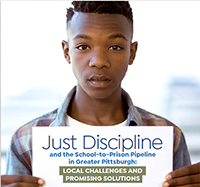
Meanwhile, the center’s Just Discipline Project targets racial disparities in school discipline, whereby in greater Pittsburgh, for instance, “Black students are suspended at seven times the rate of other students,” says Huguley. Beyond the underlying bias involved, research has shown that suspension not only hurts the student—who loses learning time and a structured environment—but fails to get at the heart of the problem.
Enter the strategy of restorative justice and Just Discipline Project Director Shawn Thomas, MSW, who helped launch Just Discipline at the University of Pittsburgh four years ago. Unlike most other restorative justice programs, says Thomas, the center places its counselors right in the school. The counselor works to strengthen relationships among students, teachers and administrators, and will sometimes lead a “healing circle”—a support structure to help unveil issues disruptive students may be having, he says. 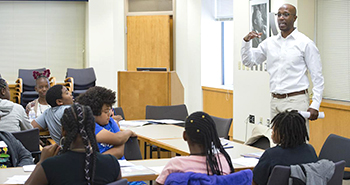 Attending will be the troubled student, a teacher, a peer (student leader) and sometimes a parent. “We go around and ask questions like, ‘What happened?’ ‘What made you feel this way?’ ‘What can we do to avoid that now?’ Then we create a safety plan to help guide that student and advise his teachers.” Each year, two Pitt social work students—one MSW and one BASW—do internships with Just Discipline.
Attending will be the troubled student, a teacher, a peer (student leader) and sometimes a parent. “We go around and ask questions like, ‘What happened?’ ‘What made you feel this way?’ ‘What can we do to avoid that now?’ Then we create a safety plan to help guide that student and advise his teachers.” Each year, two Pitt social work students—one MSW and one BASW—do internships with Just Discipline.
Homewood Bound
Another special focus for the center involving schools is the Homewood Children’s Village fellowship program for MSW students, who work to help social work practitioners and other health professionals improve children’s lives, academically and otherwise, in the low-income, mainly African American Pittsburgh community of Homewood.
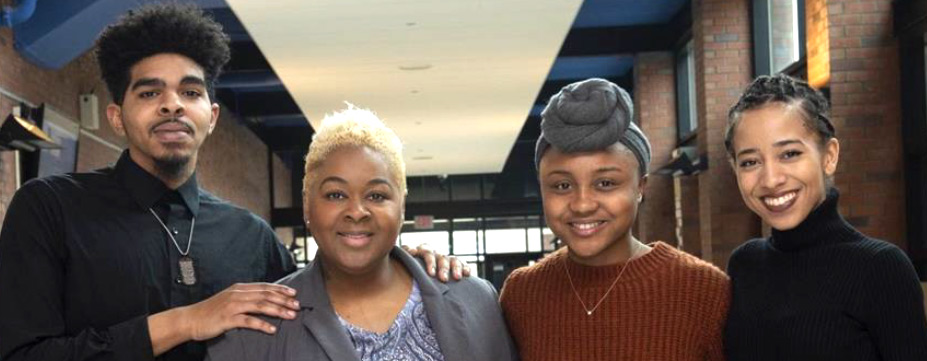
Kiva Fisher-Green (second from left) with University of Pittsburgh MSW fellows in 2019
Some eight students, who receive a stipend, get a caseload at one of three schools in Homewood, says Kiva Fisher-Green, LCSW, social work supervisor at the community services organization Homewood Children’s Village.
“They work their caseloads—this year remotely by phone or Zoom—normally with the assistance of the teachers, social workers and parents, who give them a general idea of what’s going on with the students, some of the things they might want to work on. A lot of it is behavior modification, social skills and sometimes just offering a listening ear.”
Fisher-Green calls the fellowship program a wonderful learning opportunity for the students—who often lack experience in underserved communities—that offers additional support for the families as well as the teachers. “It’s just an all-around win-win for everyone.”
Salisbury University: Justice for All, Program Management 101
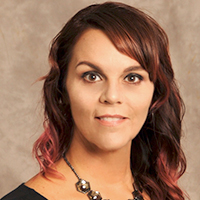
Dr. Jennifer R. Jewell, director of the School of Social Work at Salisbury University in Maryland, talks about her school’s racial justice emphasis and about how to best coordinate a large education program.
We understand that your school has been particularly active with racial justice initiatives.
Yes. This year alone we co-hosted, with Social Work Helper, the Anti-Racism Virtual Summit. It was attended by roughly 8,000 folks across the world, including several hundred of our students. We also created a fellowship called the Comunidad and Umoja Scholars Program, which supports students of color in our MSW program. Also begun this year was “Dismantling White Supremacy in Social Work,” a new course for both BASW and MSW students.
Salisbury University itself is not all that large, yet you have a social work program of some 800 students.
Well, we have students here on the Salisbury campus and at four satellites in Maryland. Then we have an online MSW regional program offered in seven states. We also have a partnership with the University of Maryland Global Campus through a Department of Defense contract to provide social work education [BASW and MSW] to the military, military contractors and family members in Europe. So I like to say that we’re worldwide.
How do you coordinate all that?
We have a very strong administrative team, with program chairs here at Salisbury, five satellite coordinators and two field directors. For years we’ve used technology to connect students both inside and outside the classroom, lately through events like virtual town halls. We’ve been able to create a supportive, student-centered learning environment that promotes students’ success across the different campuses.
University of Hawai'i at Mānoa
Correct Course: Focusing on the Native Hawaiian Healing Arts
If the University of Hawai‘i at Mānoa had to pick a single course from one of its many schools to represent the entire university, it might well be “Ke A‘o Mau." Why? Because it precisely aligns with the university’s mission of serving Native Hawaiians, other Pacific islanders and additional local populations.
“Ke A‘o Mau” (“KAM”), which roughly translates as “Learning Preserved,” has recently been made a permanent part of the Thompson School of Social Work and Public Health’s curriculum.
“It is primarily organized around the principles and practices that support cultural competency in building the Native Hawaiian social work and health workforce,” says Dr. Jing Guo, associate professor and Social Work Department chair.
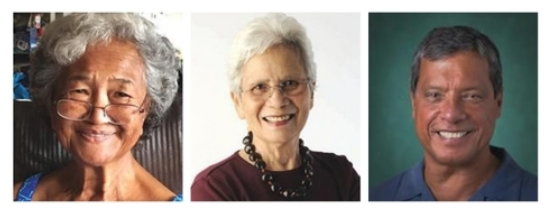
‘Anakē Lynette Kahekili Kaopuiki Paglinawan, MSW; Theresa M. Kreif, MSW, LSW; and Dr. Jonathan Kay Kamakawiwo‘ole Osorio
The interdisciplinary course this year is made up of 30 students—15 public health and 15 social work (MSW and BSW)—adds Theresa M. Kreif, MSW, LSW, faculty member and assistant to the dean, who was one of “KAM’s” initial instructors. In the past it has also included psychology, law and even medical students, and each year offers several sessions as continuing education for current social work practitioners.
Fundamental to “KAM,” says current instructor S. Kukunaokalā Yoshimoto, MSW, are its Native Hawaiian guest lecturers—“kumu loea,” or “expert teachers”—many of whom were mentors to now-retired Social Work Dean and Professor Emerita Noreen Mokuau, who developed the course. Among them have been ‘Anakē Lynette Kahekili Kaopuiki Paglinawan, MSW, a renowned expert practitioner in “ho‘oponopono,” or “setting to right, the process of conflict resolution”; health care advocate Dr. Claire Ku‘uleilani Hughes, DrPH, RD, co-founder of Native Hawaiian health organization E Ola Mau and co-creator of the Moloka‘i Diet; and Dr. Jonathan Kay Kamakawiwo‘ole Osorio, dean of the Hawai’inuiākea School of Hawaiian Knowledge, an expert in “mele” (songs) and a well-known musician himself.
For “KAM’s” fieldwork, students commit to assisting in a project with a Native Hawaiian community service organization, says Guo. For instance, “some students help community organizations in applying for grants to support their programs and services. So a course like this is really supporting our mission and is much needed.”